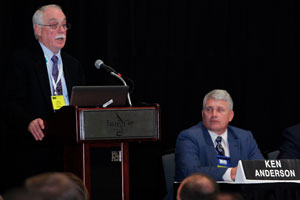Senior Reporter
Be Proactive to Minimize Corrosion Effects, Experts Advise

NASHVILLE, Tenn. — Corrosion isn’t picky. It will chew into engine block sensors, battery cables, radiators, electrical accessories, lighting systems, brakes, flooring, fuel tanks and liftgate systems, among the other features on a commercial vehicle, experts said.
Their advice: Minimize it, slow it down during a vehicle’s useful life and realize help is at hand for dealing with corrosion, whose “hot zone” on a Class 8 tractor reaches 4 feet up from the road.
If you ignore it, or don’t recognize corrosion as the cause of certain issues, those issues will recur frequently and parts costs will explode, according to discussions during a meeting of the Corrosion Control Action Committee at the Technology & Maintenance Council’s annual meeting here March 1.
Kevin Willis, fleet manager at Pepsi Cola Bottling Group, said at the meeting that TMC’s manual “Corrosion: Complaint, Cause & Correction” had been a “tremendous help” to his fleet— where prematurely replacing a liftgate can cost $20,000. Reflooring may cost $4,500 on tractors that can be 15 years old.
Willis said his maintenance program now includes spraying a corrosion inhibitor on a yearly basis.
“[We’re] spraying everything in one sweep, including connections,” he said.
The manual is available through TMC’s website.
Several sections of the manual were highlighted during the session. For example, the manual said there are three types of electrical connector lubricants — oil, grease or dispersion. These can be formulated to provide protection. It detailed the characteristics of each lubricant.
“Factors to consider when selecting a lubricant are operating temperature, material compatibility, performance and application method,” according to the manual, which detailed the criteria, too.
Another section offers maintenance and repair guidelines for moisture contamination in trailers caused by external sources and condensation inside.
TMC said vehicle corrosion is a multibillion-dollar problem for the trucking industry that stems from use of new formulations of road ice-clearing chemicals, including magnesium chloride — the most corrosive and difficult to remove once on equipment.
TMC said more than 20 states use some form of magnesium chloride to treat roads. Also, Idaho, Montana and Oregon combine it with a corrosion inhibitor.
That makes it “about 70% less corrosive than salt,” the manual said.
“There’s a brine plant at each end of the Massachusetts Turnpike,” Willis said. “So these chemicals are not going away.”
However, a suggestion was made during the meeting to provide each of American Trucking Associations’ state chapters with a copy of the manual so when they call on highways officials they can share the knowledge of what is happening, and how TMC has documented the issue and solutions for more than 15 years.

